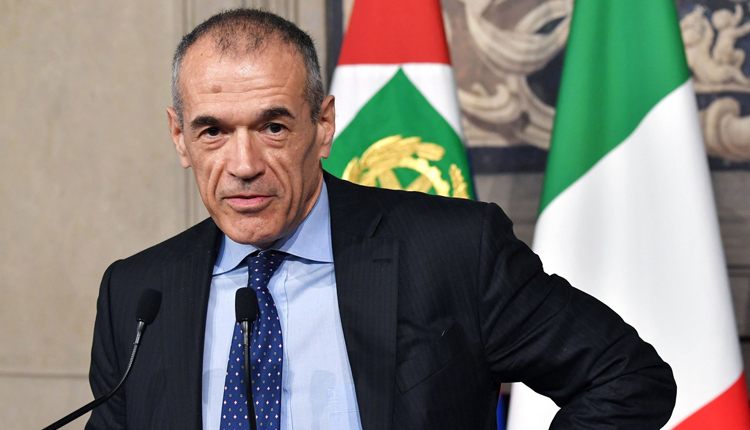Italy’s two main anti-establishment parties could yet form a government, after the man nominated as interim prime minister said politicians, rather than technocrats like himself, might be able to steer the country out of deadlock.
Wednesday’s development came as financial markets calmed after a rout a day earlier, when investor concerns about Italy’s finances prompted the biggest one-day rise since 1992 in Italian two-year bond yields and dented the euro’s exchange rate.
The crisis started when the 5-Star Movement and the right-wing League abandoned their plan to form a coalition after the head of state vetoed their choice of 81-year-old eurosceptic economist Paolo Savona as finance minister.
On Wednesday, Prime Minister-designate Carlo Cottarelli said possibilities had emerged “for the birth of a political government,” and that financial market turmoil and other circumstances, “have caused me to wait for further developments”.
For graphic on political crisis in Italy – seats in parliament click tmsnrt.rs/2wAaJL2
A source close to President Sergio Mattarella, who vetoed Savona as finance minister and appointed Cottarelli to form a government to oversee fresh elections around the end of the year, said the two men had “decided together not to rush things, (to favor) a possible political government”.
Luigi Di Maio, head of the 5-Star Movement which emerged from inconclusive elections in March as the biggest party in parliament, appealed to the League to drop its insistence on Savona as economy minister, so that the two parties could resurrect their bid to govern together.
“Let’s find someone of the same caliber as Savona, who would still remain in the government in another ministry,” Di Maio said on Facebook after meeting with Mattarella.
Mattarella welcomed the proposal, according to his staff. League leader Matteo Salvini, who is surging in opinion polls, seemed cool on the idea but did not rule it out.
“I hope we can launch a government, we’ll see in the coming hours,” he told party supporters.
However, in an apparent reference to Di Maio’s plan he added an analogy between ministers and footballers: “If someone is a goalkeeper he has to play as goalkeeper, if someone is a striker he has to play as a striker.”
Earlier in the day he had called for a snap election as “the best way to get out of this quagmire and confusion”.
UNCERTAINTY
On Tuesday, the prospect of a quick return to the polls — likely to lead to a eurosceptic government that could put Italy’s euro zone membership in question — hit Italian bonds and shares and pushed the euro to multi-month lows.
A surprise breakthrough between the president and 5-Star/League would ease uncertainty but still usher in a coalition planning to ramp up spending in the heavily indebted nation and push for changes to European Union and euro zone fiscal rules.
But even with uncertainty remaining, Italy’s government bond yields fell from multi-year highs on Wednesday and a smooth bond auction brought a degree of calm to a battered market.
“We are not yet at the point where investors refuse to lend money to Italy,” said Roberto Coronado of PineBridge Investments.
In Germany, the euro zone’s largest economy, Finance Minister Olaf Scholz played down the risk of the Italian crisis engulfing the currency area.
“One can say that Europe is better prepared for difficult situations than before. What is more, I am firmly convinced that the majority of Italians have a very pro-European stance. It is a European nation,” he told Reuters.
Three officials at the European Central Bank told Reuters the ECB was not considering any intervention as indicators were not yet showing signs of stress among banks and the central bank did not have the tools or mandate to solve what they said was being treated as essentially a political crisis.


